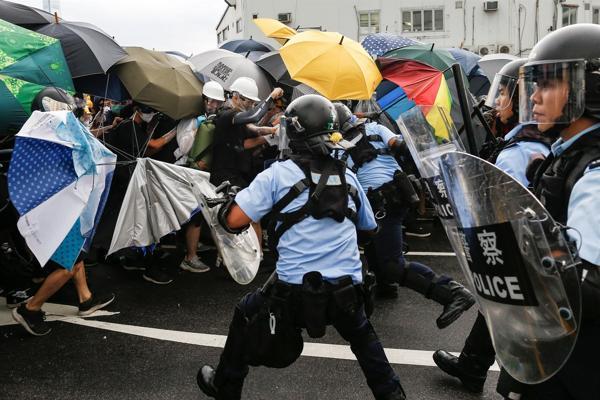Protests escalate as Hong Kong marks handover to China
HONG KONG-The Associated Press


Combative protesters tried to break into the Hong Kong legislature on July 1 as a crowd of thousands were marching in that direction on the 22nd anniversary of the former British colony's return to China.
With a crowd of a hundred or so people around them, a small group of people repeatedly rammed a cargo cart and poles into a glass panel. After they managed to get the cart wedged into the damaged panel, police grabbed the cart away from them. They also posted a sign saying to the protesters, stop charging before we use force.
The unexpected disruption delayed the march, but the crowd of thousands soon began moving out of Victoria Park even as police asked the marchers to change their route or cancel the march.
Both the combative protesters and the marchers oppose a government attempt to change extradition laws to allow suspects to be sent to China to face trial. The proposal has increased fears of eroding freedoms in the territory that was returned to China in 1997.
The embattled leader of Hong Kong pledged to be more responsive to public sentiment in a speech at a flag-raising ceremony. Carrie Lam has come under withering criticism for trying to push through the legislation. She said a series of protests and marches that have attracted hundreds of thousands of students and other participants in recent weeks have taught her that she needs to listen better to the youth and people in general.
"This has made me fully realize that I, as a politician, have to remind myself all the time of the need to grasp public sentiments accurately," she said in a five-minute speech to the gathering in the city's cavernous convention center.
She insisted her government has good intentions, but said "I will learn the lesson and ensure that the government's future work will be closer and more responsive to the aspirations, sentiments and opinions of the community."
Security guards pushed pro-democracy lawmaker Helena Wong out of the room as she walked backward shouting at Lam to resign and withdraw the "evil" legislation. She later told reporters she was voicing the grievances and opinions of the protesters, who could not get into the event.
The annual march starting in the afternoon was expected to be larger than usual because the proposed extradition bill has awakened broader fears that China is eroding the freedoms and rights guaranteed to Hong Kong for 50 years under a "one country, two systems" framework. Two marches in June against the legislation drew more than a million people, according to organizer estimates.
The government has suspended debate on the bill indefinitely, but protest leaders want it formally withdrawn and Lam's resignation. They also are demanding an independent inquiry into police actions during a June 12 protest, when officers used tear gas and rubber bullets to disperse protesters who blocked the legislature on the day debate on the bill had been scheduled to resume.
The police say the use of force was justified, but have largely since adopted softer tactics, even as protesters besieged police headquarters in recent days, pelting it with eggs and spray-painting slogans on its outer walls.
The area around Golden Bauhinia Square, where the flag-raising ceremony took place, was blocked off from Saturday to prevent protesters from gathering to disrupt it. Before the morning ceremony, protesters trying to gain access to the square were driven back by officers with plastic shields and batons, the retreating protesters pointing open umbrellas to ward off pepper spray.
"We are horrified, this is our obligation to do this, we are protecting our home," said Jack, a 26-year-old office worker who would only give his first name. "I don't know why the government is harming us. It's harming the rule of law, the rule of law is the last firewall between us and the Chinese Communist Party."
